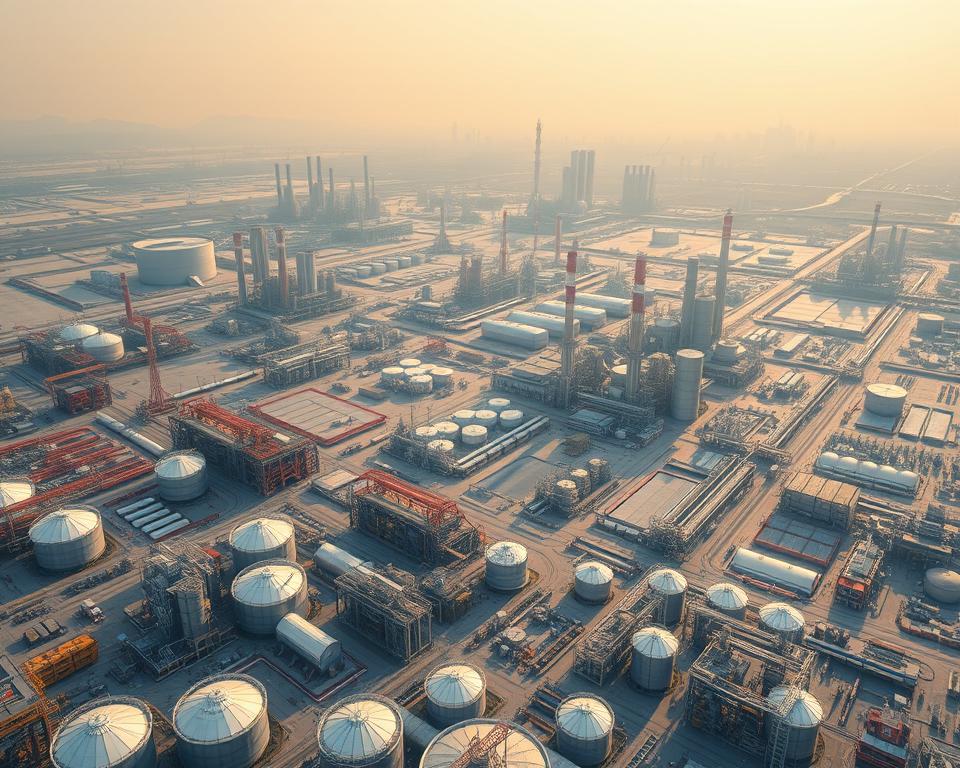Elite Chinese Chemical Providers: Integrity and Excellence
It may surprise you that China commands the global chemical market, producing over 40% of the world’s industrial chemicals? This preeminence underscores the size and impact of the Chinese chemical sector. It additionally stresses the value of picking the right partners among China chemical suppliers.
In the fast-paced world of manufacturing and chemical production, the reliability of your supplier is key. It may significantly impact your goods’ standard and functionality. Enterprises like Tianjin Chengyi International Trading Co. emerge as dependable providers within China. They guarantee premium benchmarks across multiple manufacturing uses. Here we delve into what makes leading China chemical suppliers stand out, centering on quality and reliability as the foundation of a successful partnership.
Essential Insights
- China’s leading position in the chemical sector creates vast prospects for global enterprises.
- Selecting trustworthy Chinese chemical vendors is crucial to uphold product standards and efficiency.
- Firms such as Tianjin Chengyi International Trading Co. emphasize quality control in sourcing chemicals.
- China’s large-scale chemical manufacturing affects industries spanning manufacturing to pharma.
- Comprehending quality criteria is key to manage the China chemical vendor environment.

Why Quality Matters in Chinese Chemical Supply
The impact of standards in China’s chemical sourcing is vital. Premier Chinese chemical producers maintain stringent criteria. These standards are in line with global and local regulations. They foster credibility and dependability, keeping suppliers competitive and meeting client needs.
Certifications such as ISO 9001 play a major role. They evaluate industrial compound standards. These approvals are necessary for reviewing fabrication procedures.
Deciphering Compliance Benchmarks
Excellence control in China secures supply chain robustness. Providers secure numerous approvals to confirm product prime quality. Implementing these criteria produces reliability, security, and regulatory adherence in fabrication.
Such approvals further enhance trust among international buyers. They show a commitment to high-quality industrial chemicals.
Effect of Excellence on Sector Uses
The quality of industrial chemicals from Chinese companies affects many industries. For instance in medicine, crop production, and industrial assembly. High-quality materials improve safety and productivity, vital in exacting and dependable industries.
In pharma, substandard compounds may undermine medication potency. Within farming, premium materials significantly influence harvests. Emphasizing excellence is fundamental to commercial achievement globally.
Overview of the China Chemical Industry
The Chinese chemical market is a major worldwide force, defined by remarkable development trajectories shaping economic output. As a leading chemical manufacturer worldwide, China holds a significant share of global chemical production. It is recognized as a critical center for chemical manufacturers in China. The sector has seen significant progress, with a growing need for innovative solutions in production and application.
Growth Trends in the Chemical Sector
Lately, the chemicals market has surged quickly. Urbanization, technological progress, and increased environmental awareness have driven this expansion. Companies are now prioritizing sustainability, meeting international standards while boosting efficiency. R&D funding further reveals novel compounds and techniques, powering expansion.
Industry Scale and Financial Influence
The size of the China chemical industry’s market highlights its substantial contribution to the national economy. It elevates the economy and generates countless positions in varied segments. The fiscal reach of China’s chemical providers stretches across international markets. Through continuous R&D and market agility, this sector stays central to China’s economy.
Categories of Chemicals from Top Vendors
The Chinese chemicals sector supplies numerous substances, divided into multiple chemical categories. It’s essential to grasp these classifications when seeking the best chemical suppliers from China. It matters for enterprises needing high-quality industrial compounds. Here we explore distinctions between inorganic vs. organic and specialty vs. bulk compounds. These classes address particular sector requirements.
Comparing Inorganic and Organic Chemicals
Inorganic compounds consist of metals, salts, and minerals free of carbon–hydrogen linkages. They play vital roles in production, farming, and building. In contrast, organic chemicals, being carbon-based, include fuels, solvents, and plastics. Both classes offer unique uses in varied fields, guiding sourcing approaches.
Specialty and Bulk Chemicals
Specialty substances are produced for distinct purposes, featuring specialized attributes. They often serve in medicine, personal care, and tech manufacturing. Bulk compounds, conversely, are manufactured at scale. They serve as the base for many applications, such as fertilizers and basic industrial materials. Identifying appropriate chemical classes for your demands is crucial for strategic sourcing.
Leading China Chemical Suppliers
China’s chemicals sector is booming, featuring multiple participants serving home and abroad. Premier providers in China gain renown for standards and trustworthiness. Enterprises like Tianjin Chengyi International Trading Co. excel in customer care and extensive catalogs. They meet various industry needs.
Major Industry Participants
Various veteran enterprises spearhead this contested field. Firms such as Sinopec and BASF enjoy global renown for broad portfolios and cutting-edge tactics. These leading suppliers hold significant market shares, often leading in quality and efficiency. They invest heavily in technology, staying ahead of trends with offerings from basic chemicals to complex formulations.
Innovations and New Entrants
Recent players are likewise transforming the industry terrain. These creative entities present new approaches and products, intensifying the contest among leading providers. They emphasize cutting-edge tech, green methods, and bespoke services to differentiate themselves. This fluid setting drives constant evolution in Chinese chemical products, serving users and fields dependent on them.
QA Protocols in China’s Chemical Firms
QA lies at the heart of China’s chemical enterprises. They implement strict measures to ensure products adhere to international safety and compliance standards. Reliable chemical suppliers in China often hold ISO certifications, which are benchmarks for quality across industries. These approvals demonstrate pursuit of top quality, raising trust among worldwide purchasers.
Regular checks are essential for upholding product wholeness. Regular quality control checks help identify and rectify defects before products hit the market. This strategy defends end-users and maintains producers’ renown. QC measures encompass:
- Raw material assessments
- In-process testing
- Post-production reviews
Cultivating a standards-oriented environment at all levels is essential. Employees must grasp the significance of quality assurance and embody it in their work. Educational initiatives are vital to cement this priority, guaranteeing top criteria for trustworthy suppliers.
These quality assurance steps are vital for fostering lasting client relationships globally. They help producers preserve their reputations in the cutthroat chemical market.
Finding Trustworthy Chinese Chemical Vendors
Finding trustworthy suppliers in China is essential for businesses looking to source chemicals. Cost isn’t the only factor. Several factors are important to ensure you’re working with reliable chemical suppliers. Looking at industry reputation, customer feedback, and supply chain transparency can give you valuable insights.
Essential Aspects to Review
While vetting dependable chemical providers, some factors stand out:
- Market Standing: Their sector standing reflects trustworthiness and standards.
- Customer Testimonials: Positive feedback from past clients indicates a supplier’s ability to meet standards.
- Chain Openness: Being aware of sourcing channels highlights potential risks.
- Communication Speed: Rapid replies exhibit vendor commitment to support.
- Technical Support: Access to expert advice adds value to the partnership through knowledge sharing.
Accreditations and Regulatory Adherence
Approvals are key to validating provider focus on standards. While assessing chemical vendors, look at the following accreditations and rules:
| Certification | Description |
|---|---|
| ISO 9001 | Quality management system ensuring consistent product quality. |
| REACH | Registration, Evaluation, Authorization, and Restriction of Chemicals compliance in the EU. |
| RoHS | Restriction of Hazardous Substances compliance for electronic components. |
| OSHA Compliance | Ensures safe and healthful working conditions in the workplace. |
These certifications confirm suppliers adhere to high standards of safety, environmental protection, and operational quality. Assessing distinct approvals allows you to spot dependable providers keen on conformity.
Sourcing Industrial Chemicals in China
Understanding the local market and trade regulations is key to sourcing industrial chemicals out of China. Several companies engage procurement agents for specialist knowledge. Such intermediaries possess regional expertise and links to dependable vendors. This streamlines acquisition for firms entering the China arena.
Engaging China-Based Sourcing Specialists
Chemical sourcing agents in China are vital for ensuring product quality and timely delivery. They serve as liaisons for purchasers and manufacturers, negotiate costs, and perform QC. By engaging a sourcing agent, companies can save time and reduce risks. Their knowledge helps identify trustworthy suppliers, boosting transaction success.
Managing Chinese Import Rules
Import regulations are a major consideration when sourcing from China. Understanding duties, health rules, and cert needs is vital. Firms need to align imports with Chinese laws to prevent holdups and penalties. Buying intermediaries give critical advice on these elaborate norms for hassle-free sourcing.
Ultimately, companies procuring industrial compounds from China gain from teaming with expert sourcing intermediaries. Those intermediaries assist in trade conformity and vendor trustworthiness. This approach streamlines the sourcing process, improving overall procurement efficiency.
Best Practices for Partnering with Chemical Manufacturers in China
Establishing fruitful collaborations with dependable chemical producers in China matters for enterprises desiring top-notch substances. Clear exchange is the base of successful collaborations. Clearly stating needs and expectations can lay the groundwork for a robust partnership. Frequent check-ins and engagement foster confidence and address issues promptly.
Negotiating agreements remains essential for frictionless workflow. Stakeholders should settle on core conditions like rates, timelines, and quality measures. A thorough pact avoids disputes and sets transparent ownership.
Long-term relationships with chemical manufacturers are key for consistency and reliability. Building rapport enables firms to gain favorable deals and access updates on innovations. Participating in joint activities, such as quality assessments or site visits, strengthens these bonds.
For optimal results, companies should stay adaptable and receptive. The chemical industry is constantly evolving, and adapting to these changes can improve partnerships. A proactive stance leads to successful collaborations with chemical manufacturers in China.
Obstacles for Chinese Chemical Vendors
China’s chemical sourcing arena is loaded with challenges. Regulatory hurdles are a major concern, as suppliers must adhere to stricter environmental and safety standards. These demands can cause production delays and increase operational costs, affecting the efficiency of suppliers.
Compliance Obstacles
Meeting domestic and global rules presents a key hurdle for China’s chemical vendors. Eco regulations, customs limits, and health requirements compel vendors to frequently revise their operations. This pursuit of compliance often necessitates costly upgrades, putting a strain on financial resources.
Final Thoughts
Supply chain disruptions also pose a major challenge for Chinese chemical suppliers. Global events like trade disputes and pandemics worsen these issues, leading to delays and higher costs. Employing strategies like diversifying suppliers and investing in technology can help mitigate these disruptions. It secures a more consistent production structure.
Conclusion
Selecting premier Chinese chemical vendors is vital for standards and uniformity in industrial compounds. This article has shown the wide range of chemicals available. It furthermore demonstrated how dependable vendors such as Tianjin Chengyi International Trading Co. bolster company performance.
Quality assurance and certifications are vital when picking partners. As the chemical industry expands, the need for dependable suppliers will increase. Companies need to foster solid relationships with respected producers. This boosts efficiency and supports sustainable growth.
Firms may gain from targeted procurement and market insight into China’s chemicals sector. Adopting best practices prepares them for challenges and opportunities in the dynamic industrial chemicals sector.

